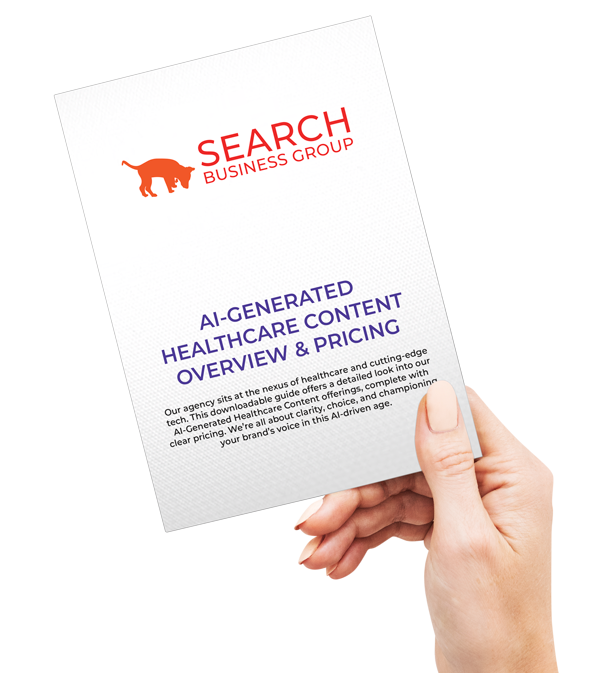As pioneers in digital marketing, we’ve seen the rise of Artificial Intelligence (AI) firsthand. An intriguing concept just a few years ago, AI is now a game-changing reality shaping how we approach marketing. Today, we’re taking a deep dive into how AI is revolutionizing one of the fundamental pillars of digital marketing: keyword research, specifically within the healthcare sector.
Understanding Keywords: The Backbone of Digital Marketing
Keywords are the terms and phrases that internet users type into search engines when looking for information. These are the essential building blocks of Search Engine Optimization (SEO), guiding the search engines to identify the relevance of your website’s content to a user’s search query.
What are Keywords?
A keyword can be a single word or a phrase that signifies the content of a webpage. For example, if you run a healthcare clinic in New York, some relevant keywords might be “healthcare clinic,” “medical services,” or “New York clinic.”
Different Types of Keywords
Short-tail Keywords: These are very concise, often consisting of just one to three words. For example, “pediatric clinic” or “dentist.”
Long-tail Keywords
These keywords are more specific and often longer phrases that searchers use. For example, “pediatric clinic in New York” or “emergency dental services near me.”
Local Keywords
Location-specific keywords are vital for businesses serving a specific geographic area. For example, “New York healthcare clinic.”
Semantic Keywords
These types of keywords are variations or synonyms of a primary keyword. If your primary keyword is “cardiologist,” semantic keywords could be “heart doctor” or “cardiology specialist.”
How Keywords Benefit SEO Strategy
Search engines like Google use keywords to understand the content of web pages. By using the right keywords in your content, you signal to the search engines what your page is about. When users search for those keywords, the search engine is more likely to display your content in the search results.
For instance, if you’ve used the keyword “best pediatric clinic in New York” in your website content, and a user searches for this exact term, your page has a higher chance of ranking in the search results, increasing visibility and potential traffic to your website.
Remember, the goal isn’t just to choose keywords that get a lot of searches but also those that are most relevant to your business. By aligning your keywords with your user’s intent, you increase the chances of attracting the right audience – one likely to engage with your content and take desired actions.
AI: The Panacea for Keyword Analysis in the Healthcare Industry
AI brings the capacity to analyze vast amounts of data rapidly. With machine learning algorithms, AI can model user behavior and predict trends. This capability is essential in healthcare, where search volumes for specific medical terms can swing dramatically. AI can predict these trends and help healthcare organizations optimize their content accordingly.
Decoding Medical Jargon: NLP Meets Semantic SEO
In our digital world, it’s vital to comprehend and navigate the complex language of healthcare. For this, we look towards Natural Language Processing (NLP) – an advanced aspect of AI that allows machines to understand, interpret, and even generate human language.
Think of NLP as a tool allowing AI to read context, subtlety, and intent like a human reader. It enables AI to go beyond simply matching keywords in a search query to understanding the deeper intent behind that query. This could include discerning whether a user is seeking information, looking to make a purchase, or needing a local service.
Combining NLP with Semantic SEO gives us a potent tool for digital marketing. Semantic SEO optimizes content based on the intent behind a user’s search query rather than simply matching keywords. It’s about understanding and answering your users’ questions comprehensively within your content.
So, by combining NLP’s ability to understand human language and Semantic SEO’s focus on intent, we can tackle the complexities of medical terminology in keyword research. This combination empowers healthcare organizations to create content that is not just keyword-focused but also crafted to meet their audience’s unique needs and concerns.
Scalpel Please: Dissecting AI-driven Tools for Keyword Research
The future of keyword research has arrived, and AI powers it. Let’s check some of these groundbreaking tools out. Below are a couple of the AI-powered tools that are redefining keyword research in healthcare:
Twinword: The Powerhouse of Keyword Analysis
Twinword is a robust tool that provides a wealth of data, including popular topics, relevant keywords, and SEO metrics. You can group keywords by user intent, topics, and patterns. Trusted by top-tier brands like Hyundai, Prodigy, and LG, Twinword takes keyword research to the next level.
CopyAI and Rytr: Unleashing Creativity with AI
While CopyAI and Rytr are AI-writing tools, they pack a punch with powerful keyword-generation features. These tools bring creativity and innovation to your keyword strategy, ensuring your content reaches your target audience.
AskToAI: The Newcomer with a Competitive Edge
AskToAI is an AI-writing tool that recently launched a Keyword Generator tool. With competitive pricing and an intuitive interface, AskToAI is a tool worth trying for your healthcare keyword research.
Bramework: Crafting Quality Content with AI
Bramework offers a comprehensive suite for creating high-quality, long-form SEO content. It also assists with keyword research, plagiarism checking, and image addition, providing an all-in-one solution for content creation.
ContextMinds: Visualizing Success
ContextMinds is a visual keyword and topic research platform, perfect for mapping out your content strategy. With real-time AI-generated topics and keywords, search volume, and keyword difficulty stats, ContextMinds offers invaluable insights for growth.
Semrush: The One-Stop Shop for SEO Success
Semrush is a comprehensive, AI-driven SEO tool that offers everything from competitor research to content marketing. With millions of keywords at your disposal and a robust site audit feature, Semrush is the key to unlocking your content’s potential.
Surfer SEO: Riding the Wave of AI-Driven SEO
Surfer SEO simplifies tasks like competitor research, keyword optimization, and content auditing. Its real-time quality and keyword usage analysis make the SEO content creation process more efficient, ensuring your healthcare content reaches new heights.
Leveraging these AI-powered tools allows you to bring precision, foresight, and efficiency to your healthcare keyword research process, setting your healthcare content apart from the competition.
Harnessing the Power of AI: Human Ingenuity Meets Technological Advancement
Technology advancements are revolutionary, but human involvement is equally crucial. Humans and AI aren’t adversaries but teammates. Adapting to AI advancements is vital, especially for digital agencies serving healthcare professionals. Success depends on the healthcare marketing agency’s ability to understand and interpret AI’s data, ask the right questions, and make informed decisions.
Blending human creativity with technology sets successful digital marketing campaigns apart. It’s this synergy we strive for here at Search Business Group. Remember, we’re here to guide you, providing the expertise, creativity, and technological insights your healthcare SEO campaign needs to make a real impact. Let’s embrace the future of healthcare digital marketing together; drop us a line now.



